Living room paneling ideas – from rustic to sleek, try these 9 styles for your space
From simple living room paneling ideas to ways to elevate your paneled walls with paint and color, take inspiration from the latest looks


The Livingetc newsletters are your inside source for what’s shaping interiors now - and what’s next. Discover trend forecasts, smart style ideas, and curated shopping inspiration that brings design to life. Subscribe today and stay ahead of the curve.
You are now subscribed
Your newsletter sign-up was successful
So you've decided on living room paneling ideas for your space, but what style exactly? You might be surprised at the versatility of wall paneling and how it can be used in the space. From rustic and traditional to contemporary and sleek, paneling can be used in myriad ways to transform a room from boring to beautiful, no matter the size or style of the space.
Even after you've decided on the feel you want to create for this living room wall decor idea, there's a huge variety of styles to choose from, from classic beadboard and Shaker-style to modern, geometric slats.
'Panelling will add character and reflect a period style that is emphasized when hit with light,' says Justyna Korczynska of paint brand Crown. 'As the sun moves throughout the day shadows and texture will be created from the reflection of the sun. Paneling looks great when color-matched to form a drenched wall.'
Take a look at these creative ways to use wall paneling that suit living rooms particularly well.
Creative living room paneling ideas to try
This so to speak 'trend' has been around since the 13th century, a way to add a decorative flourish to a room. For practical purposes, wooden wall paneling offered insulation and protection from dampness and cold.
Over time the popularity of this design grew and it became an ornate and intricate feature, seen in country manors and palaces. The styles of Georgian, Victorian, and Boiserie paneling became mainstays and, in the 18th century, wainscot paneling took over interiors.
Today, the style seen in modern living rooms is a wonderful confluence of all the yesteryear designs. This feature can transform a room from a vintage-looking space, to one that looks extremely modern and eye-catching. What style do you prefer?
The Livingetc newsletters are your inside source for what’s shaping interiors now - and what’s next. Discover trend forecasts, smart style ideas, and curated shopping inspiration that brings design to life. Subscribe today and stay ahead of the curve.
'Paneling adds character and depth to the living room,' says Poppy Peace, group creative director at Milc Interiors. 'As well as being a stylistic choice, it also serves a practical purpose of softening acoustics and protecting the walls. There are a variety of options available, from more traditional styles like wooden beading to fabric-covered panels which echo a contemporary look and give a comforting feel to a room.'
If your home doesn't already have wall paneling, then consider installing them but think about the proportions of your room first. In a small living room, paneling half a wall might help it feel less cramped. Choose designs that have a special period-specific feel, either made to measure or off the peg. And, if you love the feel of it, you could continue the panelling up the stairs if your living room is close to one.
1. Choose neutral panels as the perfect backdrop
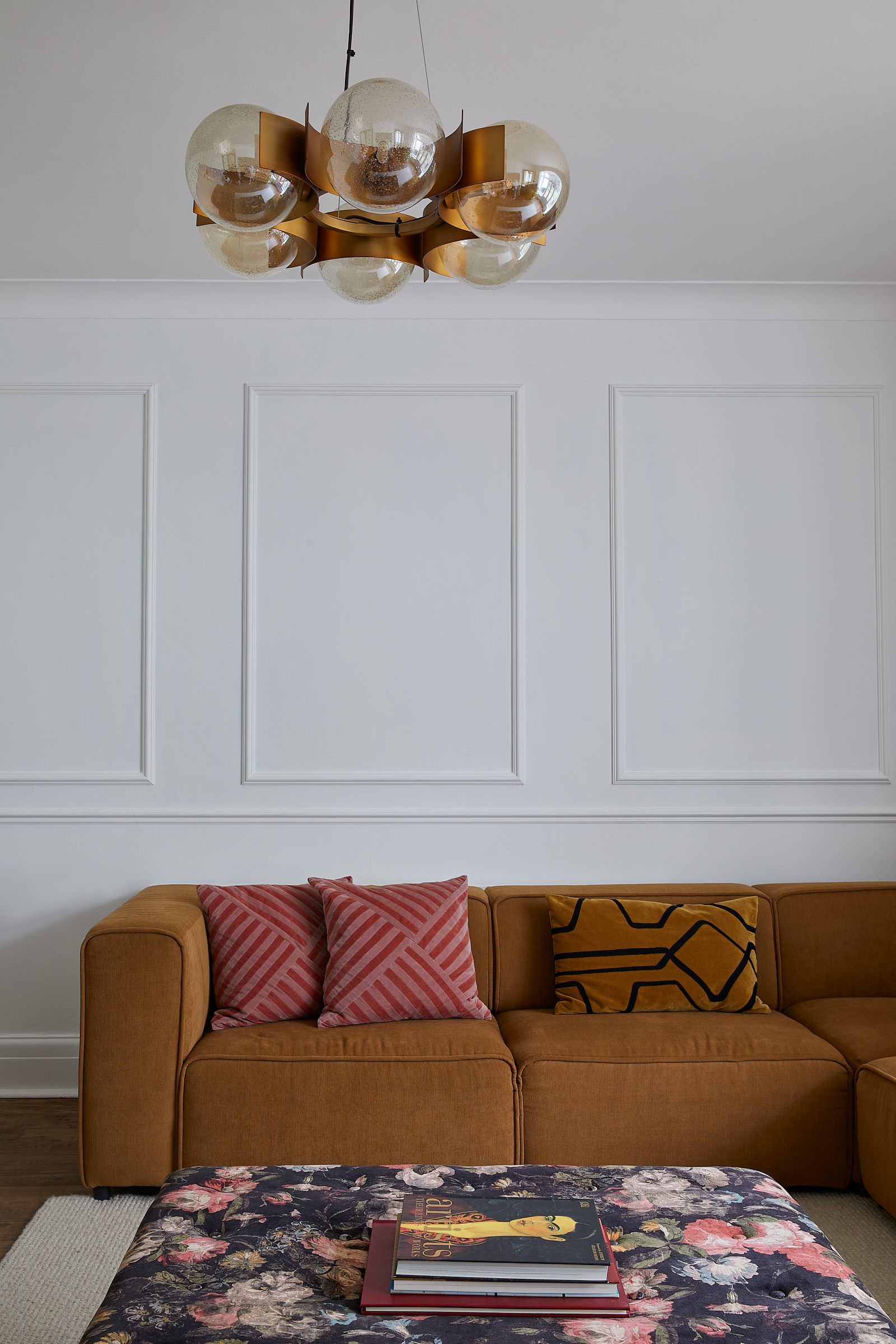
Sometimes subtlety is the best design idea. Case in point: this wonderful interior. Just the hint of beautiful, straight lines that look like a long gallery wall, painted a soft white could lift your interiors and even provide a wonderful canvas to highlight other elements.
With a decorative wall like this, choose living room furniture pieces that make a statement. Bright colors or bold patterns would look even more accentuated. Remember though, that you want to place items and furniture that do not extend till or above the paneling. Think of the frames as artworks – you want them to be seen easily.
'I would advise being sympathetic to the period of the property when deciding on the style of paneling,' says Emma Gurner, founder of Folds Inside. 'For this Victorian house, I used beading by Orac Decor which is a durable material and easy to apply. The overall effect adds a sense of grandeur and accentuates the generous proportions of the room.'
2. Try a modern slatted timber wall decor
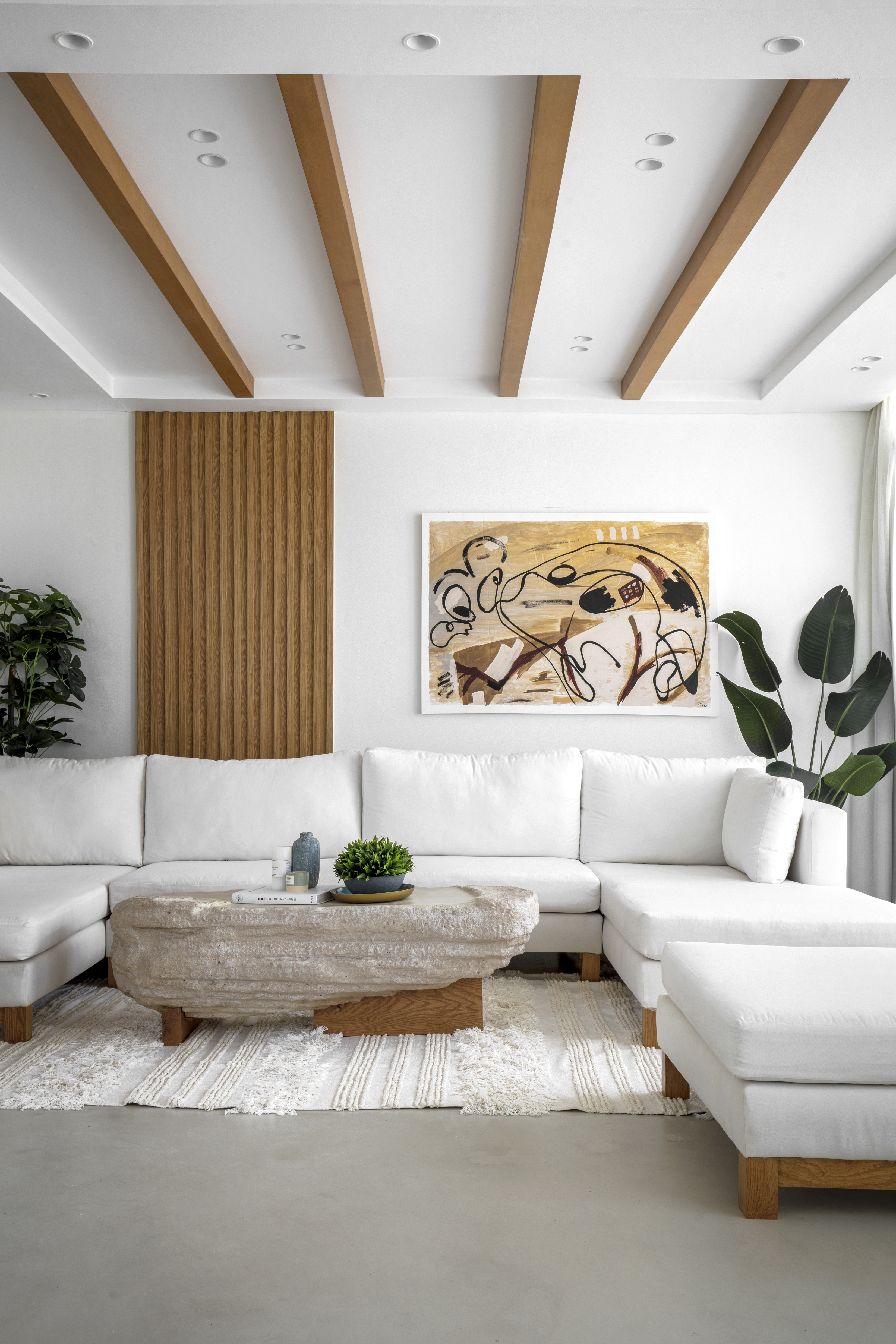
In this living room, the large, wooden panels complement the scale of the artwork, and the earthy materiality of the room and amplify the feeling of space, creating an added element of height and grandeur. Wall panels can easily stand in as an accent element in your living room.
Interestingly, if you like the concept of panels but want to try something unique, consider fabric wall panels that look just as good as wood, make a statement and allow you to mix patterns into the room.
3. Add panelling to built-in living room storage
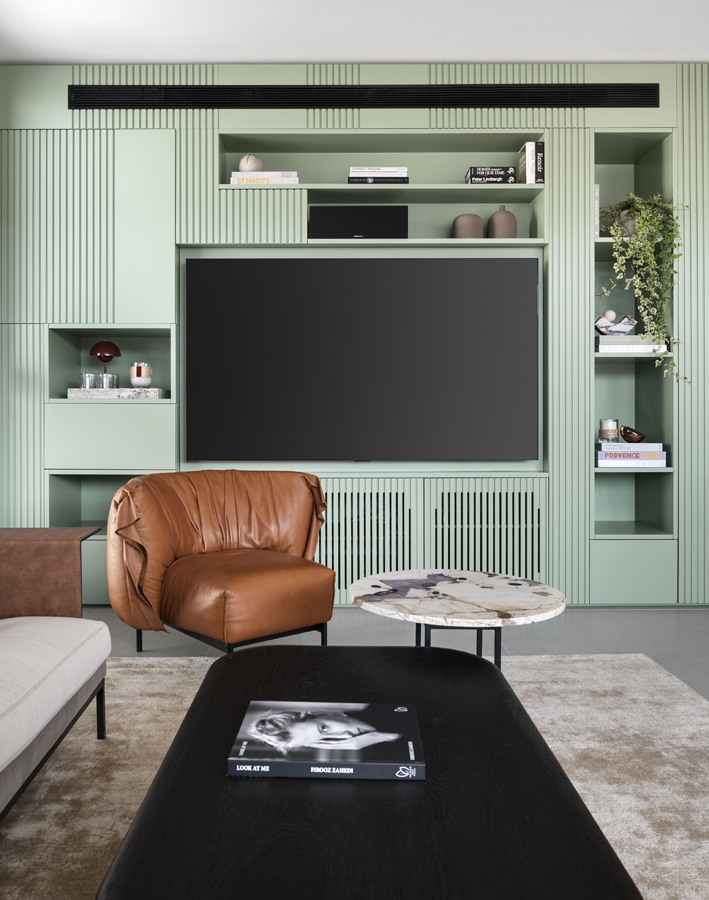
There are more ways than one of using this design element. Forget walls for a moment and think of creative living room storage ideas by paneling the front of built-in storage.
'The concept for this apartment was natural urbanity, so we chose a combination of materials, round lines, and colours that express nature and tranquillity,' says Natalie Gedalia, principal designer at YGNG. 'Green, earthy brown, sand combined with the city's concrete and straight lines in rhythmic repetitiveness were chosen for the living room. The green paneling unit in wood covers an entire wall, its ridges giving an organic feel to the space.'
4. Paint panels in a contrast to give them a lift

Sometimes you don't need lots of art or decor items to make a space pop. Work on the existing architectural features or elements and lift them for an effortlessly chic look. This living room paint idea for painting paneling in a contrast is a brilliant way to highlight this feature.
'The wall panels were original but we wanted to emphasize this geometric form by applying color,' says Hélène Pinaud, founder of Heju. 'The blue color is Granite Indigo from Papermint by Mercadier and the pink is Middleton Pink by Farrow & Ball.'
5. Choose three quarter panels
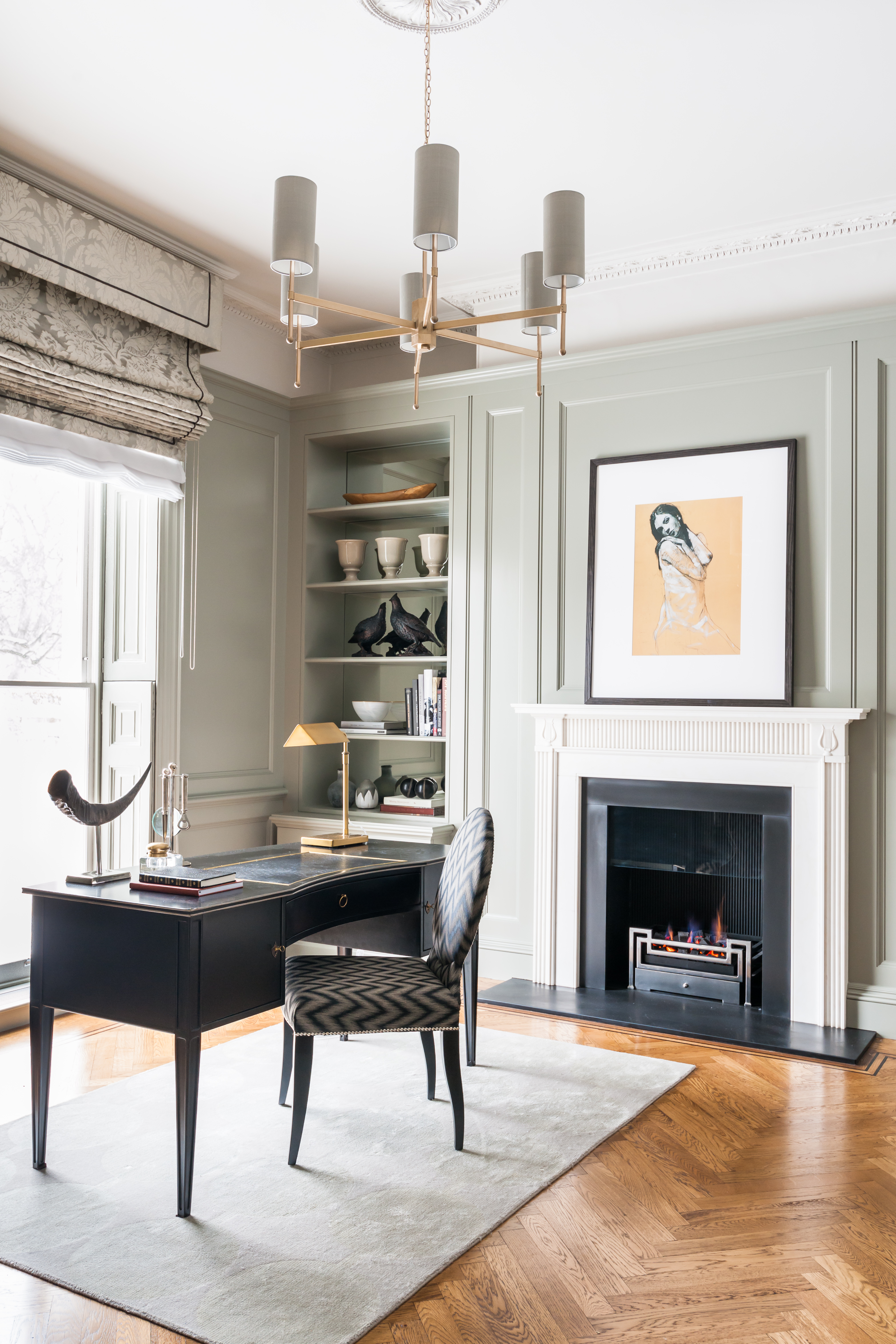
Paneling can be a great way to add grandeur to an elegant living room. And nothing is more flattering to the proportions of a lofty, period space than three quarter panelling. It not only adds decorative detail, but helps the ceiling look bigger, creating an optical illusion than particularly suits narrow spaces.
A wall and ceiling contrast can work especially well in a double-height room where breaking up the visuals, you can bring the visual volume of the room down and make it seem cozier.
Experiment with soft color contrasts for a stylish visual, as in this scheme. Choose hues that are either adjacent to each other on the color wheel or go for soft tones and pair them with grey, beige, or cream, the most friendly neutrals.
6. Create a period look with decorative panels
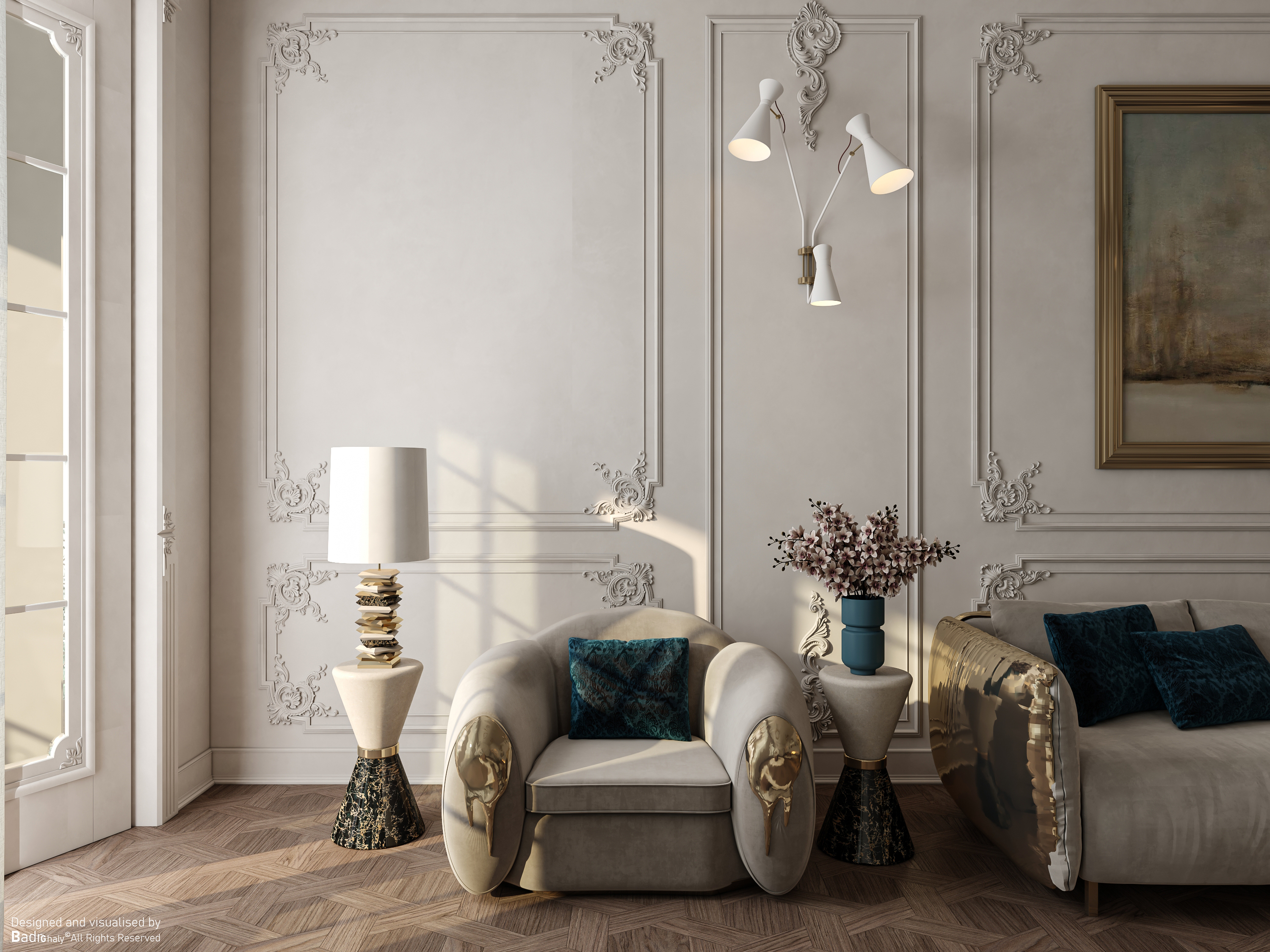
While basic paneling can be created with DIY store mouldings, you can now find more intricate, decorative-style paneling made from modern composite materials, as well as traditional plaster reliefs. This makes achieving this look more achievable than ever.
'Brands like Orac Decor have changed the game when it comes to decorative wall mouldings,' explains Livingetc's Hugh Metcalf, 'but for an authentic choice to suit your property, your best bet is still architectural plasterwork company, who handcraft each delicately.'
7. Experiment with color block on wall panels
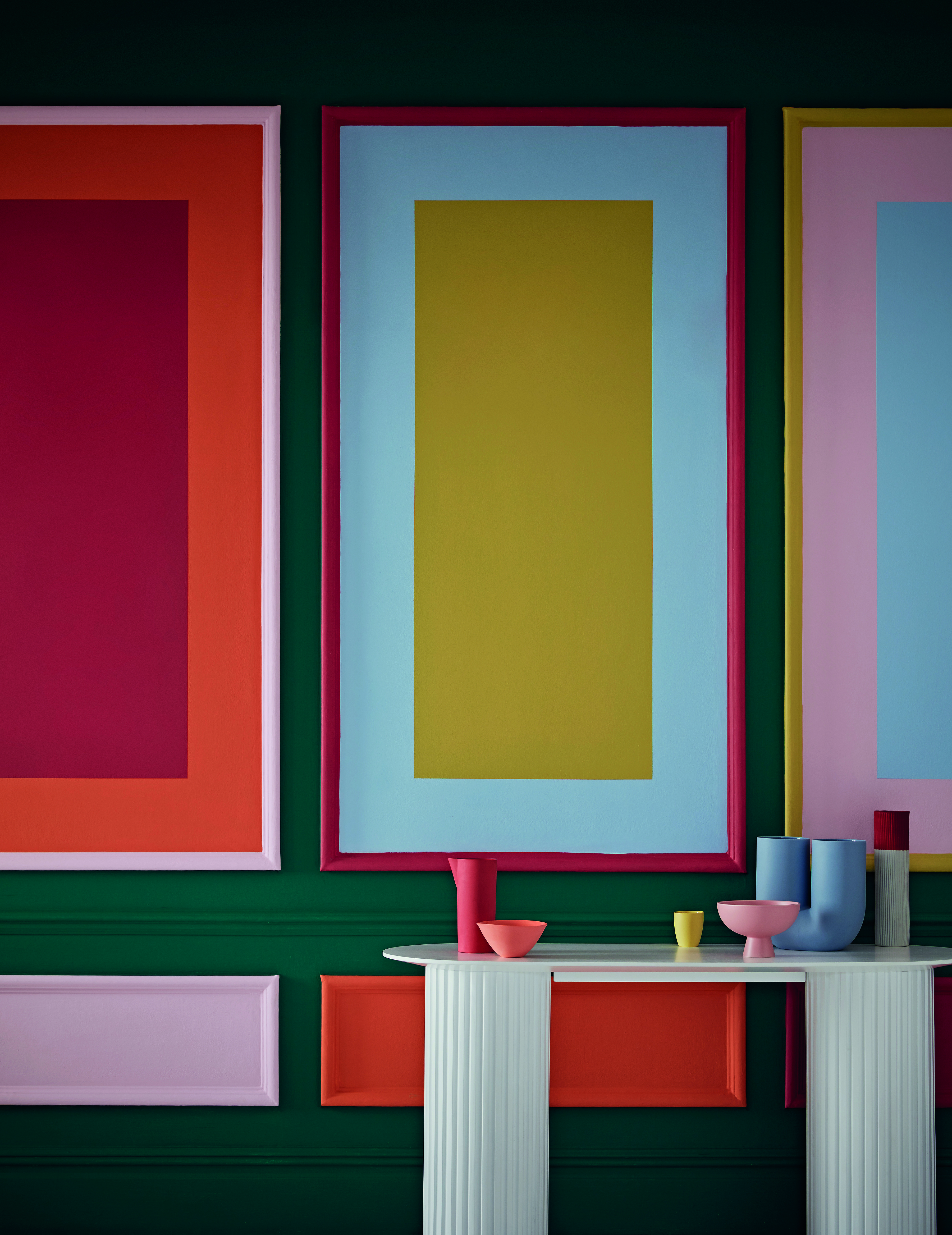
Not only do bright hues lift the mood of the room but those who use it, so why not consider going bold and bright with your wall paneling? A great way to customize your panels is by accentuating them with paint. But don't just brush a flat color onto them and call it a day. Think of interesting living room color ideas, consider unique color effects, like this color block effect.
'Combining paneling and bold hues with texture in the furniture adds depth and creativity,' says Justyna of paint brand Crown. 'Use similarly strong shades and rich patterns to add another layer of color to your room for a strong bold look. Or if you prefer simplicity, make the hues on your panels the heroes and use minimal and neutral-colored furniture and accessories.'
'The color of your walls will then become the main focus of the room,' Justyna adds. 'Plus the highlights and shadows created by the paneling will add another level to your feature color creating a very bold statement wall.'
8. Camouflage a door with wall panels
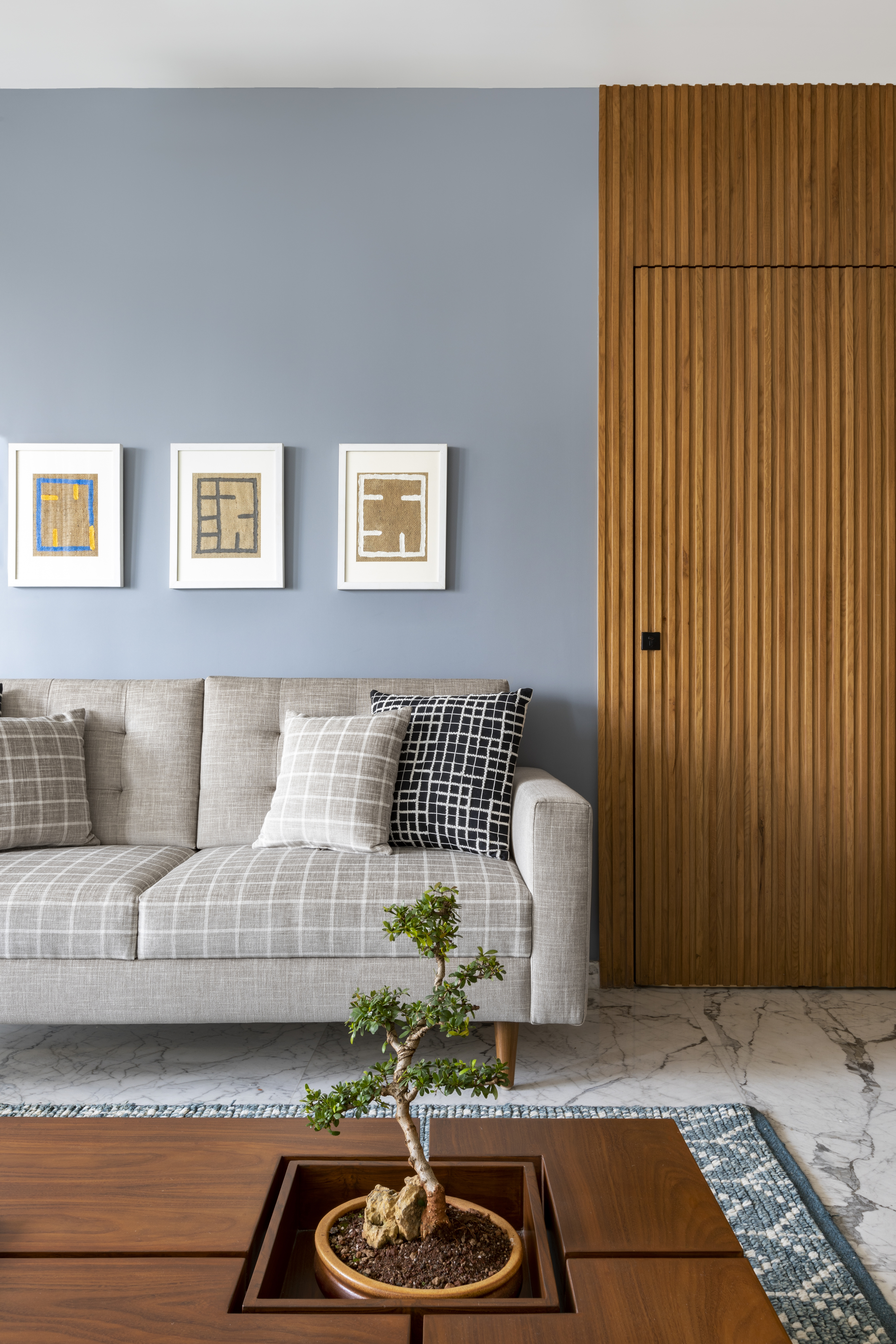
Sometimes a living room will lead to ancillary rooms like a store room or a small kitchen. Sometimes, a surplus door in your space can look jarring, so why not try a hidden door idea?
Hidden doors work brilliantly with lots of different kinds of wall paneling, but especially modern wall slats. Tactile and inviting, this is a great decorative idea, adding texture and coziness to your living room.
9. Add paneling to the ceiling to add interest
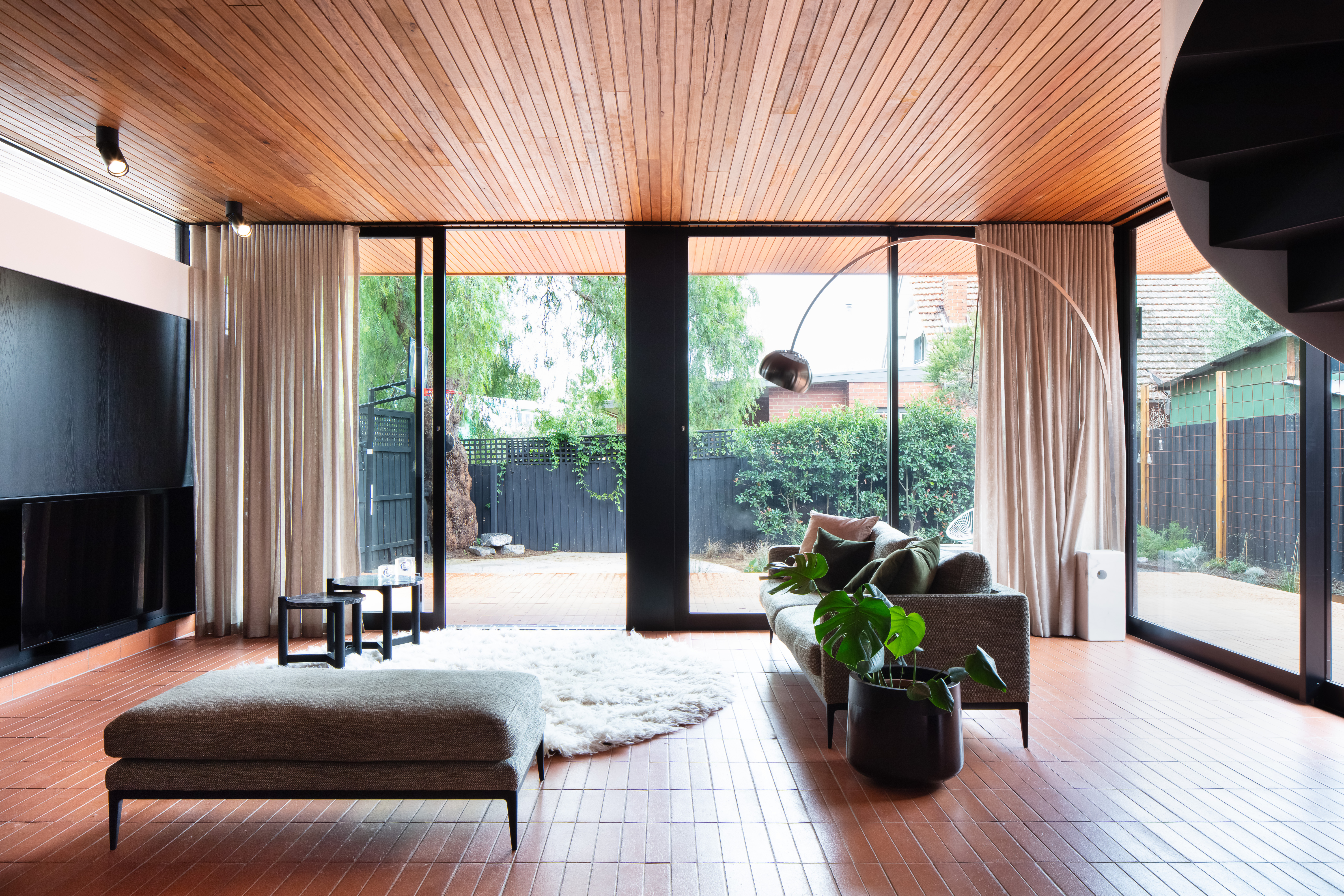
The benefits of paneling aren't just limited to walls. They can be applied to ceilings too. As the attraction of accent wall ideas has waned in recent years, decorating the ceiling has taken off as the way to bring in a feature on one surface but that unites the whole room. And this applies to paneling too.
Slatted panels are the most commonly seen on ceilings, offering the benefit of acoustic insulation between floors, particularly useful if you're decorating an apartment anywhere but the top floor, while styles like coffered ceilings tend to more common than applying Shaker-style paneling to the ceilings.
What is the best material for wall paneling?
Wall paneling can be used for several purposes. It can be used to hide unsightly walls, exposed wiring, as an accent feature, or suspended from the ceiling to give the space a decorative look. It can add to a luxury living room or give it an earthy touch.
When it comes to materials, there are a few viable options to try. Natural wood has inherent warmth, and richness, and can be sanded, sealed, and polished to make it look as good as new, always. The drawback, of course, is the cost.
MDF is a more economical option. The panels are porous so can be finished in paint or metallic finishes. MDF isn't as suitable for areas like the bathroom, however.
Fabric panels like leather, leatherette, and velvet look elegant and give a rich touch to spaces. Even tufted upholstered panels with biscuit, blind, diamond, and channel tufting can give the spaces a unique look.
Finally, PVC panels are waterproof, hygenic, and do not attract dust. Its non-porous surface does not promote the growth of mold or mildew. These are available in many colors, patterns, and textures.
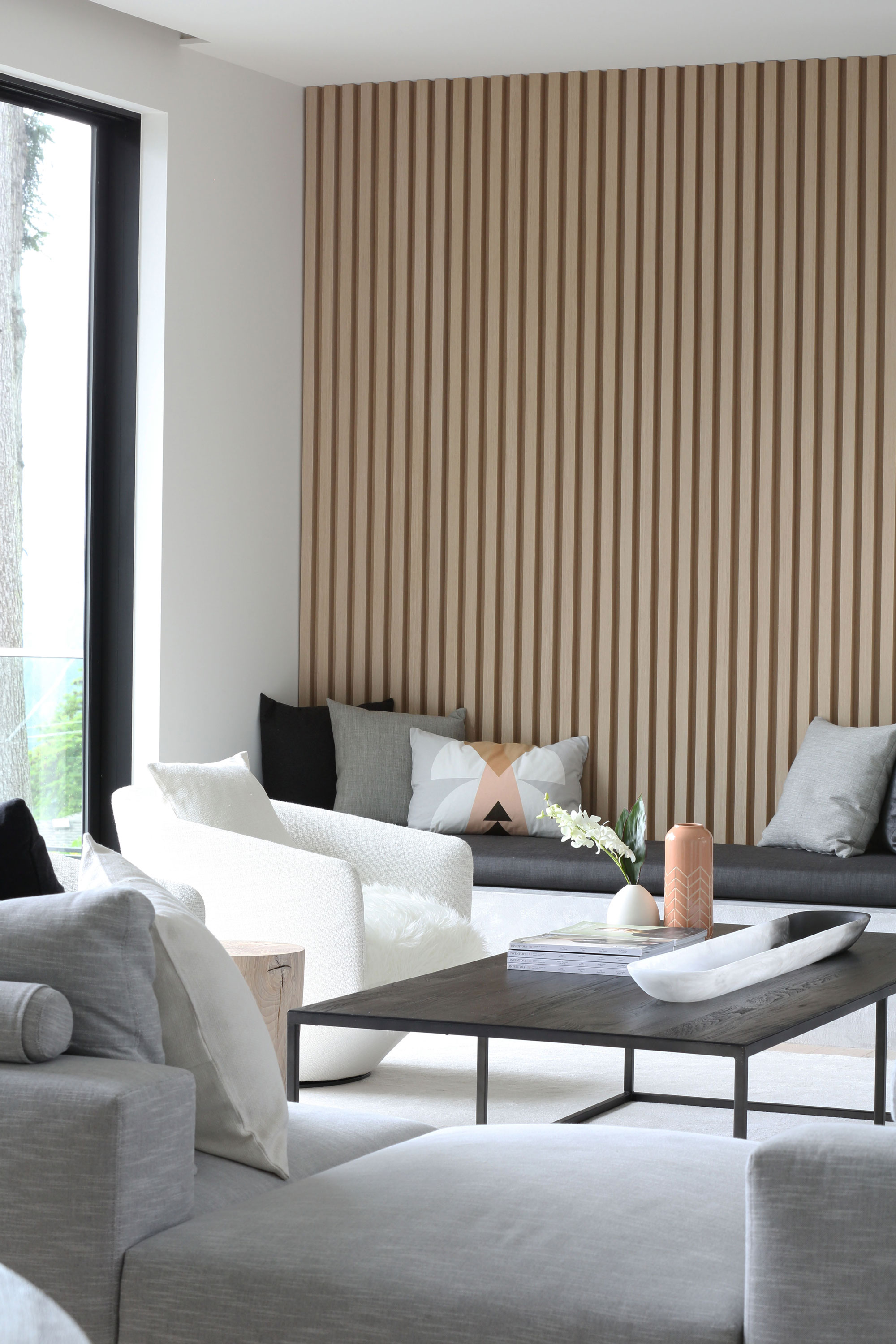
Does paneling make a room look bigger?
With clever design tricks, you can make a space seem taller and larger. If you have a small living room with low ceilings, you can create the illusion of more height with vertical panels or stripes. The tall panels will trick the eye into believing the room has more height, space, and room.

Aditi Sharma Maheshwari started her career at The Address (The Times of India), a tabloid on interiors and art. She wrote profiles of Indian artists, designers, and architects, and covered inspiring houses and commercial properties. After four years, she moved to ELLE DECOR as a senior features writer, where she contributed to the magazine and website, and also worked alongside the events team on India Design ID — the brand’s 10-day, annual design show. She wrote across topics: from designer interviews, and house tours, to new product launches, shopping pages, and reviews. After three years, she was hired as the senior editor at Houzz. The website content focused on practical advice on decorating the home and making design feel more approachable. She created fresh series on budget buys, design hacks, and DIYs, all backed with expert advice. Equipped with sizable knowledge of the industry and with a good network, she moved to Architectural Digest (Conde Nast) as the digital editor. The publication's focus was on high-end design, and her content highlighted A-listers, starchitects, and high-concept products, all customized for an audience that loves and invests in luxury. After a two-year stint, she moved to the UK and was hired at Livingetc as a design editor. She now freelances for a variety of interiors publications.